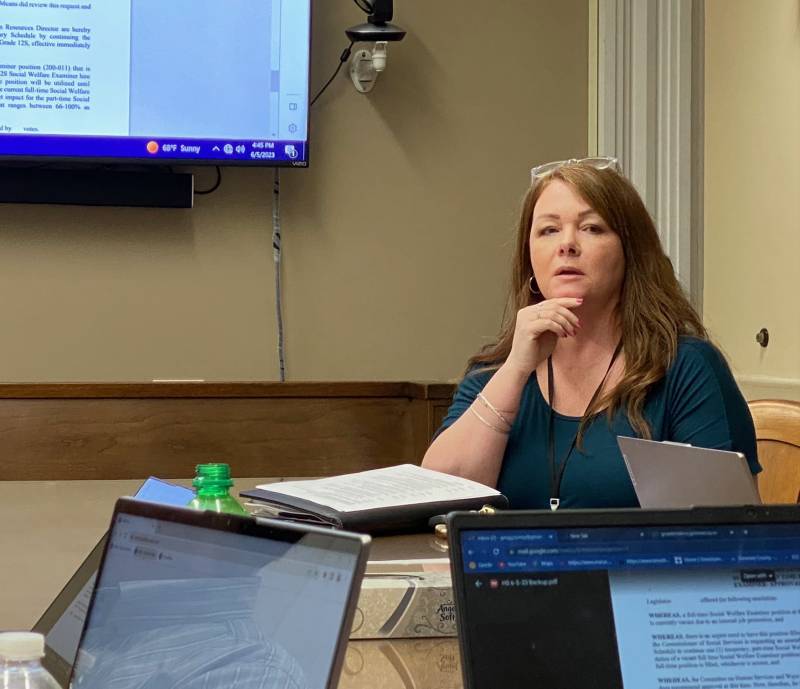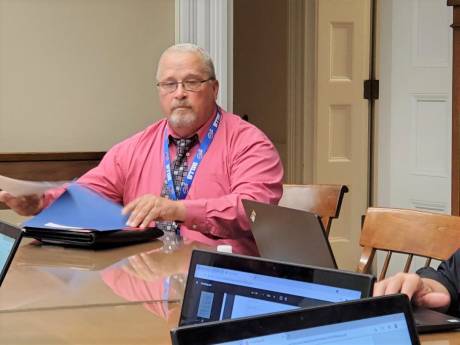Despite dealing with a public health crisis that has affected all of its programs and services, the Genesee County Department of Social Services has rolled with the changes to “continue to serve the residents of Genesee County efficiently and effectively,” the agency’s commissioner said today.
David Rumsey, presenting his departmental review at the Genesee County Legislature’s Human Services Committee at the Old County Courthouse, reported that the diligence of his 107.5 employees (including a part-timer) has “come to the forefront in 2020 during the COVID-19.”
“With their ability to adapt to a new style of remote working, virtual training and a different feel for how to conduct business, they persevered and continue to serve the residents of Genesee County efficiently and effectively,” Rumsey said.
His 30-minute talk was based on a seven-page report that touched upon programming issues relating to: family visitations; child residential placements; and youth and adult protective services; budget issues relating to personnel; Medicaid costs; family assistance and foster care; and staffing developments.
Rumsey said the agency was at 50-percent staffing through June 1 (it’s back to 100 percent now) and that made it difficult to deliver services.
“All programs and services, in part, have been affected by the COVID-19 pandemic,” he said, adding that waivers were granted – and are still in place – for all program areas from conducting face-to-face interviews.
Child Protective Services Drop with Schools Closed
With schools closed, child protective services decreased substantially, he said, as DSS was unable to get reports from school administrators. “We are seeing an uptick in CPS calls now,” he said.
He noted that the coronavirus hampered the agency’s ability to reunite families and perform court-ordered visitations until August, when DSS staff began supervising these visitations while adhering to all Center for Disease Control and Health Department COVID-19 guidelines.
Regarding foster care, Rumsey said the county had 69 young people in various foster care placements settings in August: 36 in regular foster homes; five in cluster homes; 17 in therapeutic foster care; and 11 in residential care. Additionally, two are at state training schools (detention) and one is at the New York State School for the Blind.
“The most prevalent reasons (for foster care) are still substance abuse and/or mental health issues of the caretakers or children” or the extreme acting out by the child(ren) that compromises the safety of the family members or community,” Rumsey explained, adding that costs to house foster children are substantial.
He said that placement in a “voluntary agency therapeutic foster home can typically average about $45,000 annually for board/admin, while placement in our own county foster homes, ranges up to $11,000 annually for board.
“We currently have 17 youth in placement with Hillside or Glove House therapeutic foster homes,” he reported.
The High Cost of Residential Placements
Rumsey said costs for residential placements for “our very high need and hard-to-place youth” affect expenditures and budget appropriations the most, with board and tuition expenses at residential treatment centers ranging from $145,000 to $230,000 annually for each of the 11 current placements.
He said that savings should be realized in 2021, however, as the state’s Family First Initiative is requiring Departments of Social Services to “reduce the number of residential placements by 30 percent and place those youth with families instead.”
The commissioner said that getting a foster child into an adoption setting takes time, thus keeping costs high. He said that of the 69 youth in foster care, 14 are freed for adoption.
DSS also intervenes when it comes to law enforcement and protective services for youth and adults, Rumsey said.
In 2019, New York State’s Raise The Age law stipulated that a youth can be prosecuted as an adult in criminal cases as long as he or she is at least 18 years old.
While the original concern was that more teens would be placed in both residential foster care and secured detention, this has not materialized, Rumsey said. He added that any increase in RTA spending or electronic monitoring should have no cost effect on the DSS budget as the state continues to promise 100-percent reimbursement on any RTA-identified youth.
Adult Protective Services Stretch Staff
Rumsey reported that Genesee County DSS has 161 cases in the Adult Preventive and Protective Services category, and that has caused additional strain on the staff.
“During the COVID-19 pandemic, one worker was furloughed, which left four workers and one supervisor to oversee all the protective service for adult cases and handle preventive services (representative payee), utility referrals and guardianships,” he said.
On the subject of state-mandated Medicaid, Rumsey said New York has failed to live up to its promise to take over the administration of the program and sees “no light at the end of the tunnel.”
And, based on the requirement for a five-year look-back period for chronic care (nursing home), cases continue to take a great deal of time for eligibility determination, he said.
Rumsey said the department’s budget “remains on track despite the COVID-19 pandemic,” although a 20-percent cut of state aid looms.
“Personnel expenses are as budgeted, and we continue to experience a moderate turnover rate,” he said. “In 2020, we added two assistant county attorneys and one housing coordinator to our staff and hired a director of Fiscal Operations and Child Support (Jennifer Groff), five caseworkers, three social welfare examiners, two youth workers, an intake supervisor, intake clerk, and one part-time chauffeur. At the same time, we had one retirement, 10 resignations and two terminations.”
He said that only two of five vacant positions will be filled.
Medicaid Costs Fixed Through 2020
The county’s weekly Medicaid shares have been reduced to $153,807 per week, and will remain at the level through the first few months of 2021.
“This is the County’s local share of the entire Medicaid program, no matter how many additional people are enrolled or how many benefits are provided,” he explained.
Rumsey said the agency is providing temporary assistance for needy families at an average of 99 households per month involving around 203 individuals, with many of those being “child only” cases.
In closing, Rumsey defended and praised his employees.
“The work done at DSS does matter to our community. The job they do is not easy, and can be trying at times, and the role of this agency is often misunderstood,” he said. “Even with the additional stress the COVID-19 pandemic has placed on the staff and their families they continue to work hard and are dedicated in the services they provide. I commend them all for the job they do every day.”
County Legislature Chair Rochelle Stein echoed his sentiments.
“It has been six months and we are just really starting to get into our COVID experience of what we’re going to be living in for probably the next year to year and a half,” she said. “Thank you for your leadership. Thank you for the genuine and sincere care that your staff has demonstrated to our community. It is … appreciated by all of us here at the county because it is tremendous the pressure and the stress that is on every single person in the community and your staff.”
Commitee Passes Several Resolutions
In other developments, the committee approved several resolutions (to be forwarded to the full legislature) submitted by Mental Health Services Director Lynda Battaglia and Public Health Director Paul Pettit.
On the mental health side:
- A contract with Jessica Kurzdorfer of Scottsville to provide additional psychiatric nurse practitioner hours at a rate of $95 per hour from Oct. 19 through Dec. 31. The pact calls for a maximum of 300 hours in that time period.
- A contract with Spectrum Health & Human Services in Orchard Park for crisis after-hours services from Nov. 1 through Dec. 31 at a cost not to exceed $12,534. Battaglia said the number of cases has increased considerably since April.
- A renewal of a contract with Consilium Staffing of Irving, Texas, for psychiatry services at the same cost as what already has been budgeted for 2020 and 2021.
On the health department side:
- An agreement with FairBridge Inn & Suites on Federal Drive, Batavia, to provide temporary lodging for both COVID-19 isolation and quarantine of individuals who are unable to stay in their homes and have a home in which to sequester themselves. The contract, to run through Aug. 26, 2021, calls for a rate of $40 per night if the stay is at least seven days or a rate of $50 per night if the stay is less than seven days. Costs are covered by the county.
- Acceptance of a $23,130 from the state Department of Health to support the county’s Children and Youth with Special Health Care Needs Program. The grant period is Oct. 1, 2020 through March 31, 2021.
- Contracting with Melissa Caputi of Batavia, an occupational therapist, to provide addition special education itinerant teacher services, classroom services and evaluator services in the Preschool Supportive Health Services Program retroactively for the period of Aug. 15, 2020 through June 30, 2021. The pay rate is established by New York State, with 59.5 percent of the service costs qualifying for state reimbursement, less any Medicaid payment on Medicaid-eligible children.


